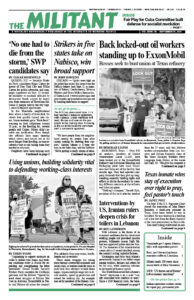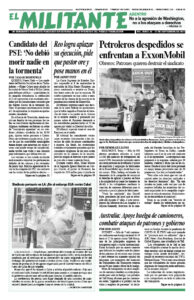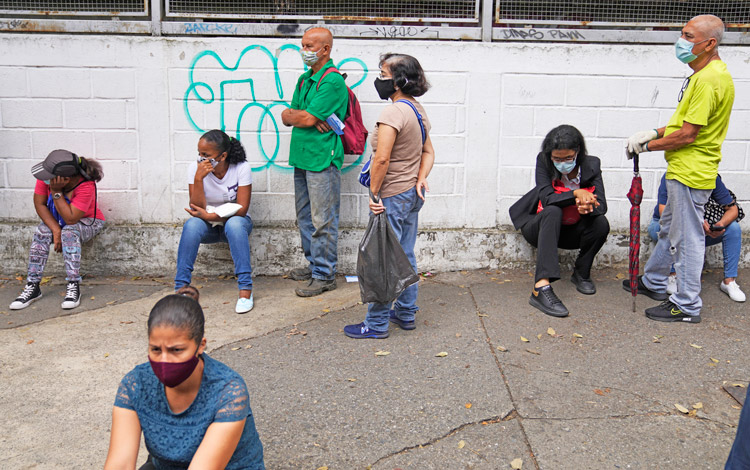Representatives of the Venezuelan government of Nicolás Maduro and the country’s main capitalist opposition parties met in Mexico City Sept. 3-6. They agreed to terms for further talks aimed at breaking a polarized political deadlock between both sides, and the opposition’s backers in Washington, over the last five years.
Talks beginning Sept. 24 will include discussion on steps to get credit from the International Monetary Fund and to expand access to coronavirus vaccines, a joint statement said.
In addition, the Venezuelan government is demanding the lifting of sanctions by Washington and governments in Europe, and control of the country’s assets held abroad — like the U.S. bank accounts of Venezuela’s state-owned PDVSA oil company and its subsidiary, Citgo, worth billions.
The imperialist rulers have blocked Caracas’ access to these funds, claiming the U.S.-groomed opposition leader, Juan Guaidó, is the real head of state. Guaidó proclaimed himself president in January 2019, saying Maduro’s reelection the year before was fraudulent.
With bipartisan support the Donald Trump administration backed Guaidó’s failed attempts to provoke a military coup and mobilize popular support to remove Maduro. It ratcheted up sanctions that fall hardest on working people. The Biden administration continues to recognize Guaidó as president, even after the opposition lost a majority in the legislature last December, and Guaidó was removed as head of parliament.
Guaidó’s “interim government” was further weakened after opposition politicians had to resign from it as a condition to be included in the talks in Mexico. Unity Platform, a coalition of opposition parties participating in the talks, announced Aug. 31 that it would participate in the gubernatorial and mayoral elections in November.
In May, Venezuela’s National Assembly — currently with a majority from Maduro’s United Socialist Party of Venezuela (PSUV) and its allies — named two opposition figures to the five-person National Electoral Council, which oversees elections. This is the first time the opposition will have two seats in the body since 2005. Last month Venezuelan authorities released opposition leader Freddy Guevara from prison. He is now taking part in the talks.
The Biden administration “welcomed” the negotiations and reiterated its plan to continue using sanctions to squeeze the Maduro government.
The Cuban government has consistently defended the right of the people of Venezuela to make their own decisions without interference from U.S. imperialism or capitalist regimes in the region. Washington’s assaults on Venezuela’s sovereignty are tied to the U.S. rulers’ effort to overthrow Cuba’s socialist revolution.
It will be hard for the talks to “reach reasonable agreements while continuing to use the guillotine of the sanctions,” Cuban daily Granma said Aug. 18.
Current negotiations take place as a yearslong economic and social crisis continues to bear down on working people in Venezuela. Hyperinflation means food and medicine is often too expensive for most people to obtain, and over 5 million — 15% of the population — have fled the country since 2015.
A recession in 2014 was aggravated by the drop of world oil prices the next year and stepped-up U.S. sanctions against the country’s oil and mining industries in 2017.
In the last three years Maduro’s government has carried out the privatization of dozens of state-owned enterprises, opened oil and mining industries to investment from foreign ventures, pushed through tax laws favorable to capitalist monopolies, backed evictions of peasants from land sought by big landowners, and enacted anti-labor measures.
Disgruntlement over gov’t measures
A regulation issued by the Ministry of Labor in 2018, setting a new official minimum wage, has been the focus of widespread dissatisfaction. It guts existing clauses for wage and benefit increases in union contracts or other agreements with state and private employers.
Workers in Venezuela have also been subjected to bosses’ increasing use of bonuses and food bags instead of wage increases, not knowing when or if these will arrive.
“These supplements don’t count toward retirement, social security benefits,” trade unionist Eduardo Sánchez told Venezuelanalysis April 16. “It’s a boon for employers since the bonuses come with no future obligations.”
Disappointed supporters of former President Hugo Chávez say the measures taken by Maduro’s government are evidence that the PSUV is abandoning Chávez’s “socialist dream.” Chávez came to power over two decades ago amid mass mobilizations by workers and peasants. He used revenue from the country’s oil industry to fund a series of welfare programs.
The steps taken by Maduro are in continuity with Chávez’s attempt to manage a capitalist economy in which exploiters and exploited can supposedly coexist. At no point did Chávez or Maduro organize working people to deepen their own struggles against the country’s capitalist rulers on the road to taking political power into their own hands and making a socialist revolution, as Cuban workers and farmers did under the Marxist leadership of Fidel Castro and the July 26 Movement.
The recent shifts in Venezuela reflect the government’s inability to grant concessions to working people due to the depth of the capitalist crisis.


